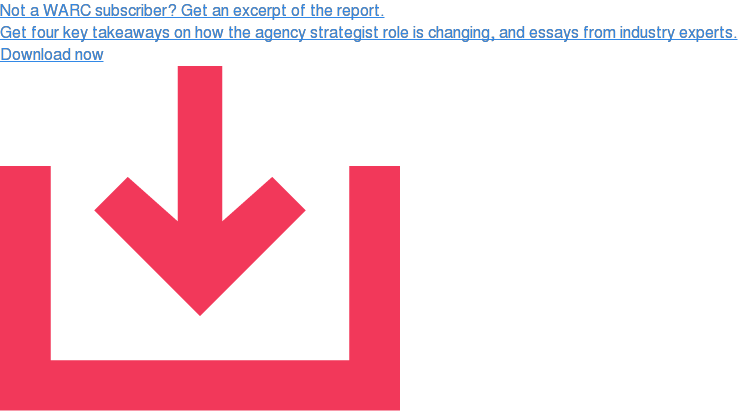This commentary appears in WARC’s new ‘Future of Strategy’ report, based on a global survey of senior agency planners. The report covers the current state of the strategic discipline, future opportunities and challenges, and guidance on building the planning team of the future.
According to WARC’s Future of Strategy survey, when hiring for their teams, the standout candidates senior planners are looking for are curious and concise people from diverse backgrounds. For me, hiring really comes down to the candidate’s ability to be concise: or, put another way, their ability to simplify.
Great planners need to ask the right questions that help narrow ten objectives down to one. They transform gigabytes of data and dozens of Powerpoint decks into one relevant insight. And, they make sure that success gets measured, not against as many metrics as possible, but only against the most appropriate key metrics.
If you think about it, planners are a bit like conductors. They decipher and orchestrate meaning and actionable plans from a mix of tactile inputs, digital signals, and cultural trends. A great planner adapts to the mayhem of modern times by accessing information in real time, and continually – concisely – transforming this information into actionable insights.
Beyond this general ability to be concise, here are three core, practical skills that, in my point of view, the planner of the future should have.
Core skill #1 – Derive attitudinal and behavioural insights
Through focus group interviews, social listening tools, and other methodologies, planners of our times should uncover attitudes and behavioural consumer insights that help resolve a business issue or propel a business/brand growth opportunity.
Why it matters: All the hype around big data has made us overlook the fact that while behavioural insights tell us what people do and when they do it, they are not able to explain people’s motivations behind their actions. Only the symbiosis of big and small data will give clients a holistic and contextual understanding of their target audiences.
Core skill #2 – Craft experience briefs
Great planners are able to write creative briefs that are based not on a pointy tagline-like proposition, but on a single-minded thought that clearly explains the intended campaign experience – to inspire big, media-neutral ideas.
Why it matters: Experience briefs matter because they recognise the importance of people’s social connections and prompt creative ideas that have the potential to go beyond just ads and become truly relevant to people’s daily routines. And that’s what allows brands to cut through competitive clutter and build brand trust for the long run.
Core skill #3 – Provide real-time strategic counsel
Great planners add value and strategic counsel at every stage of the creative process – starting from ideation all the way to production, and even beyond the campaign period.
Why it matters: With consumers being able to interact with brands and their campaigns on an ongoing basis, it’s crucial to keep track of people’s reactions and their sentiment. This generates insights for future initiatives, and also uncovers opportunities that could help a campaign maintain momentum through earned media.
At the end of the day, however, it’s all about simplification. Making sense out of chaos, defining the problem, and creating a blueprint from A to B.
It’s as simple as that – which is what makes it so hard to be a great planner.


